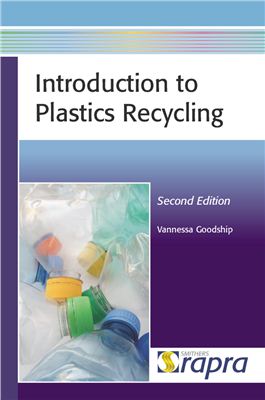2nd ed. - Smithers Rapra Press, 2008. - 180 pages.
"Although recycling has a long history, it is only relatively recently that environmental protection and waste management issues have come to the forefront of both public and political awareness. Outside the fields of expertise, generally little is known about either plastics or their recyclability.
As in the successful first edition, this book provides straightforward information on plastic materials and technology, including the options for recycling plastics, with special focus on mechanical recycling. It touches on all the major problems associated with recovering and recycling plastics at a level intended to be accessible to any reader with an interest in this field, whatever their background. It also looks at some of the broader issues surrounding successful waste management of plastics.
This new edition reflects the great strides that have been made to increase recycling rates worldwide in recent years. It considers the expansion of infrastructure in the UK to support plastic recycling and major achievements that have been made in gaining widespread public support and participation for recycling schemes; specifically the need to manage waste on an individual household level. Current issues surrounding council recycling of plastic bottles, and the practice of providing free plastic carrier bags by supermarkets, are also considered.
Biopolymers are expected to have a major impact on plastic markets in the future and therefore some of the issues of biodegradability versus recycling are expanded in this second edition, as is the wider context of life cycle analysis and legislation.
Key features Clear, easy to understand text Written for a broad audience both within and outside the polymer industry Good introduction to plastic materials and technology with useful illustrations Explains recycling terminology, technology and material quality issues Up-to-date information on the plastics recycling infrastructure and recent developments "
"Although recycling has a long history, it is only relatively recently that environmental protection and waste management issues have come to the forefront of both public and political awareness. Outside the fields of expertise, generally little is known about either plastics or their recyclability.
As in the successful first edition, this book provides straightforward information on plastic materials and technology, including the options for recycling plastics, with special focus on mechanical recycling. It touches on all the major problems associated with recovering and recycling plastics at a level intended to be accessible to any reader with an interest in this field, whatever their background. It also looks at some of the broader issues surrounding successful waste management of plastics.
This new edition reflects the great strides that have been made to increase recycling rates worldwide in recent years. It considers the expansion of infrastructure in the UK to support plastic recycling and major achievements that have been made in gaining widespread public support and participation for recycling schemes; specifically the need to manage waste on an individual household level. Current issues surrounding council recycling of plastic bottles, and the practice of providing free plastic carrier bags by supermarkets, are also considered.
Biopolymers are expected to have a major impact on plastic markets in the future and therefore some of the issues of biodegradability versus recycling are expanded in this second edition, as is the wider context of life cycle analysis and legislation.
Key features Clear, easy to understand text Written for a broad audience both within and outside the polymer industry Good introduction to plastic materials and technology with useful illustrations Explains recycling terminology, technology and material quality issues Up-to-date information on the plastics recycling infrastructure and recent developments "

